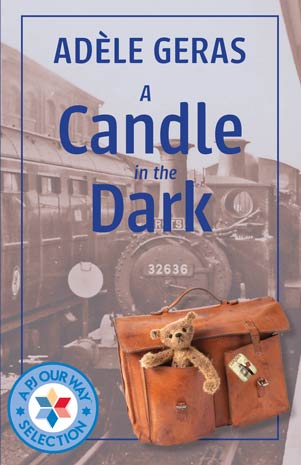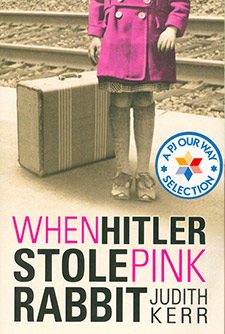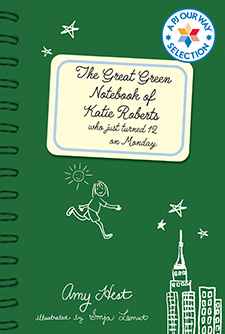A Candle in the Dark
Germany is Clara’s home, but in 1938 Jews are no longer safe there. Clara and her little brother, Maxi, have to leave everything behind and go to England to start a new life with a family they have never met.
Average Rating
( hint: Login to leave a review! )
49 Reviews
Leave Review
What the Book is About
Jewish Content & Values
Positive Role Models
Content Advisory
Talk it Over!
More for You
Nine-year-old Clara and her five-year-old brother, Max, must part with their mother and Germany as they travel on the Kindertransport to England. Clara learns English, makes new friends and looks after her little brother while bravely battling homesickness. Throughout their journey, kind people look out for the siblings and offer them plenty of love and support. A Historical Note afterword offers more information about 1939 Germany and the Kindertransport.
- Clara celebrates Hanukkah by lighting the candles at her hosts’ English home.
- Clara and her brother escape Nazi Germany and antisemitism on the Kindertransport to England.
- Clara is a brave and sensitive character. She is proud of her Jewish identity, and instead of singing Silent Night at the school Nativity play, she chooses to sing a Hanukkah song instead.
- The Bairds, Clara and Max’s host family, are very kind, and Phyllis is a true friend to Clara.
- When the Kindertransport train left Germany, people in Holland welcomed the children with chocolate and snacks; one old man gave Clara a beautiful rag doll.
This book begins in Nazi Germany in 1938 and describes the events of Kristallnacht and general antisemitism in a very accessible, age-appropriate way. Although the very idea of young children being separated from their parents indefinitely (on the Kindertransport) will be hard for some kids to read about, this sweet story has a positive ending and is unlikely to frighten young readers.
When Phyllis mentions how dangerous Germany is for Jews, her friend Eileen says, “my mum says you can depend on Jewish people to exaggerate.” Is this a prejudiced thing to say? Why or why not?
Most of the nearly 10,000 children who emigrated to England through the Kindertransports eventually settled there. Many continued on to have successful and productive lives, including artist Frank Auerbach, therapist Dr. Ruth Westheimer, physicist and Nobel laureate Walter Kohn, and Dr. Leslie Brent, who arrived in the UK in 1938 as a thirteen-year-old refugee and eventually won the Nobel Prize, along with Peter Medawar and Rupert Billingham, for their work in immunological tolerance.
What the Book is About
Nine-year-old Clara and her five-year-old brother, Max, must part with their mother and Germany as they travel on the Kindertransport to England. Clara learns English, makes new friends and looks after her little brother while bravely battling homesickness. Throughout their journey, kind people look out for the siblings and offer them plenty of love and support. A Historical Note afterword offers more information about 1939 Germany and the Kindertransport.
Jewish Content & Values
- Clara celebrates Hanukkah by lighting the candles at her hosts’ English home.
- Clara and her brother escape Nazi Germany and antisemitism on the Kindertransport to England.
Positive Role Models
- Clara is a brave and sensitive character. She is proud of her Jewish identity, and instead of singing Silent Night at the school Nativity play, she chooses to sing a Hanukkah song instead.
- The Bairds, Clara and Max’s host family, are very kind, and Phyllis is a true friend to Clara.
- When the Kindertransport train left Germany, people in Holland welcomed the children with chocolate and snacks; one old man gave Clara a beautiful rag doll.
Content Advisory
This book begins in Nazi Germany in 1938 and describes the events of Kristallnacht and general antisemitism in a very accessible, age-appropriate way. Although the very idea of young children being separated from their parents indefinitely (on the Kindertransport) will be hard for some kids to read about, this sweet story has a positive ending and is unlikely to frighten young readers.
Talk it Over!
When Phyllis mentions how dangerous Germany is for Jews, her friend Eileen says, “my mum says you can depend on Jewish people to exaggerate.” Is this a prejudiced thing to say? Why or why not?
More for You
Most of the nearly 10,000 children who emigrated to England through the Kindertransports eventually settled there. Many continued on to have successful and productive lives, including artist Frank Auerbach, therapist Dr. Ruth Westheimer, physicist and Nobel laureate Walter Kohn, and Dr. Leslie Brent, who arrived in the UK in 1938 as a thirteen-year-old refugee and eventually won the Nobel Prize, along with Peter Medawar and Rupert Billingham, for their work in immunological tolerance.



